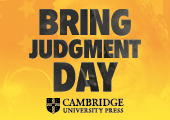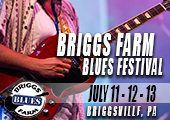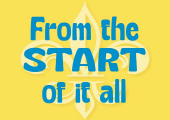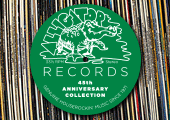IRMA THOMAS
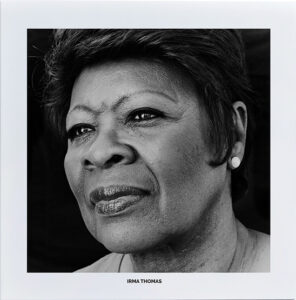 Love Is the Foundation
Love Is the Foundation
Newvelle Records – NVN001
Recorded just before the 2020 pandemic lockdown, for inclusion in Newvelle Records’ four-LP box set The New Orleans Collection (that also includes albums by Little Freddie King, Ellis Marsalis, and Jon Cleary), Love Is the Foundation is a stunning entry into 80-year-old Irma Thomas’ discography. Like two of her other late career albums, the Best Contemporary Blues Grammy winner After the Rain (2006) and Simply Grand (2008), this recording proves that her vocal skills remain undiminished. These 11 tracks represent some of her finest recorded work. Producer Ben Chace assembled an outstanding rhythm section for the singer, including drummer Johnny Vidacovich; percussionist Alfred “Uganda” Roberts (his final session); keyboard player Kyle Roussel; guitarist Stephen Daly; and bassist Paul Defiglia; and a great horn section of saxophonist Roderick Paulin, trumpeter Andrew Baham, and trombonist Terrance Taplin. Esplanade Studios owner and engineer Misha Kachkachishvili captured Thomas’ soulful singing supported by this fantastic band with the genuine warmth and immediacy of a live performance.
The program of tunes is a revelation. While some are better known than others, Thomas makes them sound fresh and puts a personal stamp on each one. There are a number of classic R&B songs: Billy Myles’ My Love Is (a 1960 hit for Little Willie John); Brook Benton’s I Don’t Know (a 1959 hit for Ruth Brown); Chuck Willis’ It’s Too Late (1956); Russ Morgan’s So Long (another hit for Brown in 1949); Bob Hilliard and Mort Garson’s Our Day Will Come (a hit for Ruby & the Romantics in 1962); a standard by Alberto Dominguez and Milton Leeds, Perfidia (a hit for Xavier Cugat in 1940 and the Ventures in 1960); three early reggae hits recast as R&B numbers—Freddie McKay’s Picture on the Wall (1971), Lloyd Robinson and Devon Russell’s Love Is the Foundation a.k.a. Love Is the Key (1969), and Ken Boothe’s Second Chance (1972); and two selections from J.J. Cale’s debut LP, Naturally (1972)—Don’t Go to Strangers and Crying Eyes. On paper it may sound like an odd mix of tunes, but the cohesive, solid, and empathetic underpinning the band provides for Thomas’ iconic voice and strong vocal chops make Love Is the Foundation a sonic pleasure from start to finish.
—Robert H. Cataliotti
WEE WILLIE WALKER
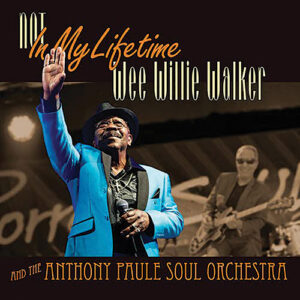 Not in My Lifetime
Not in My Lifetime
Blue Dot – BDR-CD-110
Soul singer Wee Willie Walker, who died in 2019, never attained the commercial success he deserved, but he left behind an indelible body of work, the best of which can stand alongside that of his role models and contemporaries like Sam Cooke, Al Green, Otis Redding, and James Carr (his stablemate at Quinton Claunch’s Goldwax Records for a while in the 1960s).
Walker passed away three days after completing this album; the opening track is a brief but poignant excerpt from an interview he did with co-producer and songwriter Christine Vitale after the sessions were done. What follows are 13 tracks of unexpurgated deep soul, redolent with the spirit of the ’60s-era Memphis in which Walker honed his chops and recorded some of his most classic sides.
As a balladeer, Walker could summon the kind of spiritual ache girded by sensual longing that generations of soul singers have struggled to approximate, although—unlike the haunted, doom-laden Carr, for instance—he usually made it sound as if redemption might be on the horizon, no matter how dark things might seem. His delivery on up-tempo numbers was, if anything, more natural-sounding and less forced than Redding’s legendary but often mannered “Got ta! Got ta! Got ta!” imprecations. The Anthony Paule Soul Orchestra supports him here with deep-pocketed sureness; Paule’s horn arrangements invoke the Memphis Horns and the Willie Mitchell / Bowlegs Miller axis, yet retain their own identity and freshness.
One track, Warm to Cool to Cold, is a remake of a 1968 Goldwax outing (leased to Checker), and it’s a revelation—the original, a Redding-like ballad, was a throat-ripping cry of anguish; this time out, with a country-flavored, upbeat-accented arrangement and some hard-booting sax work from Charles McNeal, Walker and his compatriots sound determined to dance the pain away. A similar resolve spurs outings such as the ironically rollicking Heartbreak (how many vocalists could make lyrics like “I’m weak in the knees, loose in my head / My baby done left me, I wish I was dead” sound like an invitation to a party?). Even when nursing a broken heart, Wee Willie Walker always managed to let the light shine through; it’s our privilege and blessing that we’ll be able to continue basking in that light for as long as this music lives.
—David Whiteis
CLARENCE SPADY
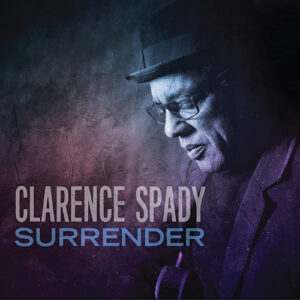 Surrender
Surrender
Nola Blue Records – NB014
It’s been 13 years since Spady’s last album, Just Between Us, and it’s a pleasure to have his smooth vocals and crisp guitar work back on this new album. His soulful songs reach deep into his life, moving over emotional touchstones such as the death of his son and the passing of one of his musical partners.
The album opens with the crisp and crunchy guitars of If My Life Was a Book, a Memphis soul stunner that lays down a laid-back rhythm that’s straight out of Stax. A lilting organ segues into the Philly soul Good Conversation, a funky jazz tune written by the guitar prodigy Adam Schultz, who never wastes a note in his spacious solo on the instrumental bridge. When My Blood Runs Cold features Spady’s cascading leads spilling into a slow-burning jazz blues that screams with pain and a promise that a relationship will end when the singer’s blood turns to ice and he leaves. K-Man is a bright, bopping soul runner in which Spady celebrates the living spirit of his late son, Khalique; the song’s first line captures the warmth and joy of the song: “When I wake up in the morning first thing I see is you / feelings come over me that make me want to cry . . . / Your spirit will always pull me through.” The gospel-inflected Surrender rides along a slowly unfolding blues backbeat that mimics the gradual process of giving up to God and the immense freedom that comes in the surrender. The album features three never-released Spady originals from a 1999 live performance at River Street Jazz Café in Wilkes-Barre, Pennsylvania—Addiction Game, Jones Fall Expressway, Pick Me Up—that epitomize the energy and fun of his live shows.
Surrender showcases the warm intimacy of Spady’s lyricism and musical arrangements, and we can hope that it won’t be quite so long before we hear from him again.
—Henry L. Carrigan Jr.
DEXTER ALLEN
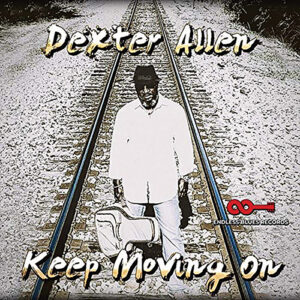 Keep Moving On
Keep Moving On
Endless Blues – No #
Mississippi-born Dexter Allen, a former lead guitarist in Bobby Rush’s touring band, has been recording under his own name since 2008 (his 2015 outing, Trilogy of My Bluez, was released on Rush’s Deep Rush imprint). His sound is a robust mix of soul blues (seasoned by rhythmic and melodic flavorings borrowed from Rush’s patented “folk funk” style), smooth-edged pop, and church-honed spiritual intensity. He can deliver a breezy, uptown 12-bar swinger (Love Talk) with the same effortless panache he brings to a Rushian funk blues workout (the inspirational title tune), an irony-toughened 12-bar ballad (F.A.B.U.L.I.S.T. Woman, which also features some lithe, Albert King–like reverse-action string bends), or a country-tinged gospel blues lament (I Can’t Live Without You). That same country-rooted feel informs Blues Eyed Girl, his vividly drawn vignette of a series of meet cute fantasies (“She walked up to me and asked for a light / I said, ‘I don’t smoke,’ she said ‘I don’t bite’”).
Aside from being a deft guitar stylist and imaginative melodicist, Allen is an expressive lyric storyteller (I Can’t Live Without You is one of the more emotionally searing ballads we’ve been offered recently, and Allen delivers it with an appropriately throat-tightening urgency); even when he’s delivering a tough, hard-blues throwdown like Pack Up My Bags (“I’m gonna pack all my crap up and move on out the door”) or bemoaning the bittersweet vicissitudes of doomed erotic infatuation (the aforementioned F.A.B.U.L.I.S.T. Woman), he avoids snarkiness or cheap-laugh double entendres.
This is fully a Dexter Allen project; he wrote all the songs, he’s credited as both producer and executive producer, and although he has assembled a fine team of musicians for this recording, at various points he takes command of keyboards and bass, as well as lead guitar. Aficionados of “pure” soul and blues will appreciate the all-natural instrumentation—like his mentor Rush, Allen is capable of grafting a contemporary southern soul aesthetic onto frameworks that can please both old-school devotees and those with more modernist sensibilities. Although he has yet to break out into widespread “mainstream” acceptance, Allen is certainly an important blues voice, and his continued growth and development bode well for the music’s future.
—David Whiteis
ROY ROBERTS
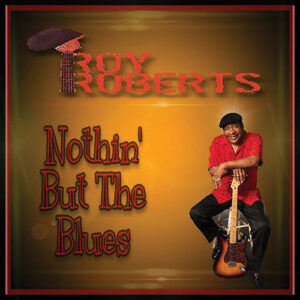 Nothin’ but the Blues
Nothin’ but the Blues
Rock House – No #
Roy Roberts may be purveying “nothin’ but the blues” these days, but he has an extensive and varied musical resume, having worked as a sideman and/or session musician for artists ranging from Solomon Burke through Otis Redding, Eddie Floyd, William Bell, Stevie Wonder, O.B. McClinton, and many more. In fact, although by today’s standards he’s considered a straight-ahead bluesman, Roberts’ sound could more accurately be described as “soul blues”—but according to the rootsier definition of the 1980s–early ’90s era, when live instrumentation and deep soul vocals still dominated the genre.
This time out, Roberts leans heavily on the 12-bar structure, although in a few instances—most notably (and, possibly, ironically) the pop-tinged Just One More Blues Song—he delves into more challenging, somewhat less conventional melodic and rhythmic territory. But despite his fealty to conventional blues structures and lyric themes (titles such as I Got a Gypsy Woman, Have You Seen My Baby, Why Didn’t You Come Home, and Dirty Old Man are representative, to say nothing of the three songs that actually include the word “blues” in their titles), Roberts infuses new meaning into well-established tropes and themes. His voice, although not as emotive as that of Burke, Redding, and some of the other deep soul artists he’s worked with, is an expressive instrument, deep-timbred and supple; he relies on understatement, rather than over-emoting, to get his point across.
Roberts’ fretwork, meanwhile, especially on ballads, is unerringly precise; you can almost hear him thinking as he places each note indelibly in its place. But this isn’t an exercise in mechanical studiousness; it’s a celebration of carefully honed artistic craftsmanship, and the result is deep pleasure for the listener—contrary to what some adherents of the so-called punk aesthetic (and, unfortunately, some romanticizing worshipers of blues “primitivism”) might suggest, well-honed craft and dedication to artistic excellence can be the best vehicles for conveying powerful emotion. Roy Roberts is living proof.
—David Whiteis
BIG CHIEF MONK BOUDREAUX
 Bloodstains & Teardrops
Bloodstains & Teardrops
Whiskey Bayou Records – WSK 1006
Big Chief Monk Boudreaux stands tall today as one of the great culture bearers in New Orleans. The oldest of the city’s Black Masking or Mardi Gras Indians, he continues to lead the Golden Eagles tribe. Along with his longtime collaborator Big Chief Bo Dollis of the Wild Magnolias, as well as Neville Brothers’ uncle Big Chief Jolly of the Wild Tchoupitoulas, Boudreaux is a seminal figure in the creation of Black Indian funk music. He has recorded in numerous contexts over the year, ranging from traditional vocal call-and-response supported by hand percussion to R&B, blues rock, and reggae projects. On Bloodstains & Teardrops, he takes a two-pronged approach, applying his vocals and improvised lyrics to both reggae and blues grooves.
The project began five years ago when Boudreaux and guitarist Damon Fowler traveled to Jamaica where they laid down five tracks supported by bassist Jason “Welsh Bass” Welsh, drummer Wayne “Unga Barunga” Thompson, and vocalist Ali Meek at Tad’s International Limited studio in Kingston. The album was completed when overdubs and an additional five tracks were recorded at Whiskey Bayou Studios in Houma, Louisiana, with guitarist Tab Benoit (also on drums and keyboards), harmonica and accordion player Johnny Sansone, fiddler Michael Doucet, guitarist Eric Johanson, and bassist Corey Duplechin.
Boudreaux moves seamlessly between the two genres. Both the title track and Mr. Okra Man are reggae numbers that feature a call-and-response between Boudreaux’s spontaneous lyrical inventions and Meeks’ counterpoint with his “toasting.” Jamaica and Louisiana come together on Blues, Blues, Blues as a loping reggae groove is enhanced by Sansone’s Cajun-flavored accordion fills. That Cajun feel is also prominent on Should’ve Been a Preacher Man, which features Sansone’s accordion and Doucet’s fiddle. Benoit’s searing guitar work stands out on both Kingston Blues and Indian Blues. On the blues rocker On Bended Knees, Sansone’s incendiary harmonica really pushes Boudreaux to deliver a standout vocal. The highlight of the set is a grungy blues vamp Blue Mountains, on which Boudreaux narrates his pilgrimage to Bob Marley’s birthplace and mausoleum in the mountain village of Nine Mile. At age 80, Big Chief Monk Boudreaux keeps the creative flame burning brightly on Bloodstains & Teardrops.
— Robert H. Cataliotti
MERRY CLAYTON
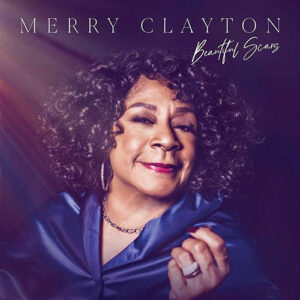 Beautiful Scars
Beautiful Scars
Motown Gospel / Ode Records B003331802
If there’s an artist with a testimony, it’s Merry Clayton.
Many know her as Mick Jagger’s duet partner on the Rolling Stones’ 1969 hit Gimme Shelter, as well as for her appearance in the award-winning 2013 documentary 20 Feet from Stardom. While Clayton has sung with a full panoply of stars, from Bobby Darin to Ringo Starr to Carole King, she is a solo artist in her own right.
But Clayton’s life almost ended in 2014, when a car accident so shattered her body that doctors had to amputate her legs below the knees. She has channeled her trauma into music, and one result is the star-studded album Beautiful Scars.
Some of the album tracks are inspirational and others are straight-up gospel, her voice honed from growing up a preacher’s kid in Louisiana. Among the inspirational selections are the Diane Warren–penned title track, which transforms Clayton’s scars and bruises into badges of courage and character. Another ballad, Love Is a Mighty River, written by Clayton, co-producer Terry Young, Chris Martin of Coldplay (Clayton appeared on Coldplay’s 2015 A Head Full of Dreams), and co-producer Lou Adler, features Martin on piano and a cameo by the Soweto Gospel Choir.
Churchier choices include Room at the Altar, the brisk He Made a Way, and Deliverance. On Deliverance, Clayton uses every ion of sonic space to improvise, while L.A.’s Finest Choir offers lush and soaring harmonies. The song would have been even better had it not faded at the end but concluded with an emotional denouement of voices and musicians. On Clayton’s rootsy cover of Sam Cooke’s Touch the Hem of His Garment, L.A’s Finest Choir keeps tempo by stamping their feet.
Clayton does her finest singing on Oh What a Friend, not the hymn but a Terry Young composition about the fatherliness of God. Its 1970s pop sensibility is accented by brief trumpet flourishes from Herb Albert. Speaking of pop sensibility, the Ooh Child Medley finds Clayton joined by Jackie DeShannon, another voice with experience written all over it, on a gospelized version of DeShannon’s 1969 hit, Put a Little Love in Your Heart.
The pop, soul, R&B, and gospel mix that is Beautiful Scars is an ideal musical salute to Merry Clayton’s career, because she excels in all of these genres.
—Robert M. Marovich
GREG GORDON PROJECT
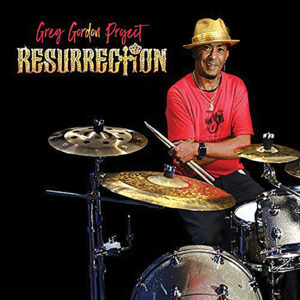 Resurrection
Resurrection
Greg Gordon – No #
Drummer Greg Gordon comes from a family with deep musical roots in his hometown of Lafayette, Louisiana. Over the course of five decades, his drumming has propelled the bands of such giants from the region as Buckwheat Zydeco, C.J. Chenier, Barbara Lynn, Dwayne Dopsie, and Roy Head. Gordon decided that 2021 would be the year that he stepped out on his own, and with his debut recording, Resurrection, he applies his percussive skills and groove-making mastery to a program that ranges from soulful blues to funky jazz to New Orleans–inspired street beats. In addition to fronting a top-notch band of local associates, Gordon joins the ranks of drummers who sing, and the results are promising.
The program kicks off with a nod to James Brown with the primal Double Booty Bump. He pays tribute to another seminal funk influence with the Meters’ Cissy Strut that allows him to show off his drum chops as he channels the dynamic snare/bass drum dialogue trademarked by Zigaboo Modeliste. His funky drumming spars with the horns on a cover of Tchfunkta written by Galactic drummer Stanton Moore. Gordon’s R&B chops—as a singer and drummer—are showcased on Johnny “Guitar” Watson’s A Real Mother for Ya. Gordon pays tribute to his longtime bandmate, the late guitarist Paul “Lil’ Buck” Sinegal with the sizzling blues instrumental Lil Buck Shuffle. The title track offers an opportunity for Gordon to rap and explore hip-hop beats. With Blossom, Gordon takes things into the realm of jazz fusion, evoking the CTI records of flutist Hubert Laws. Two guest vocalists bring the fire to the proceedings—Sharon Thomas with a blustering cover of John Ellison’s 1967 R&B hit Some Kind of Wonderful and Kami Cole on the haunting soul blues G.G. Blues. Gordon really gets to strut his stuff with the swaggering groove on the New Orleans brass band–style workout St. Louis and Bourbon. Greg Gordon’s career as a front man is off to a promising start with Resurrection.
— Robert H. Cataliotti
TIA CARROLL
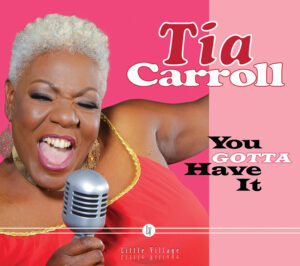 You Gotta Have It
You Gotta Have It
Little Village – LVF-1038
Yes, there are still “well-kept secrets” on local blues circuits throughout the country. Despite her reputation among knowledgeable fans in the San Francisco Bay area, where she’s been a club stalwart for decades, and where she currently hosts Tia Carroll’s Awesome Radio Show on station KPOO, it’s safe to say that Tia Carroll qualifies for this designation.
Carroll sings in a dusky, expressive croon with a raspy edge, sometimes evoking late-period Denise LaSalle; she’s capable of conveying intensity without over-emoting. On this, her first-ever recording, she delves into a varied set ranging from the Staple Singers classic Why Am I Treated So Bad through vintage R&B/pop balladry (Johnny Ace’s Never Let Me Go, graced with an appropriately lugubrious-sounding horn backing) and overlooked blues and southern soul classics (Robert Cray’s Our Last Time, Z.Z. Hill’s I Need Someone) to Anthony Hamilton’s harrowing Ain’t Nobody Worryin’, an anguished litany of the tragedies and crises that haunt poor and Black people in America.
A powerful sense of purpose informs this set. Although she never sounds over-earnest or ideological (and the propulsive, funk-seasoned arrangements make it clear that, whatever else may be on offer, the party is still on), it’s also clear that Tia Carroll’s message is one of strength, resolve, and prevailing over hard times. Two of her self-written pieces here, Leaving Again and Move On, are hard-eyed declarations of independence from a wronged woman determined to reclaim her life, her heart, and her body as her own. Rick Estrin’s Don’t Put Your Hands on Me takes on special urgency when sung by a woman; even when she’s singing tales of vulnerability and heartbreak (or, in Even When I’m Not Alone, limning the loneliness of the hard-scuffling blues singer with almost cinematic vividness), that tough-edged vocal timbre of hers makes it clear that this is a woman who will not be defeated or cowed. Meanwhile, her producers have assembled a skintight, versatile studio crew more than capable of both accompanying and prodding Carroll in any direction she might choose to go.
Tia Carroll’s voice is definitely one whose time has come.
—David Whiteis
JIMMY BURNS
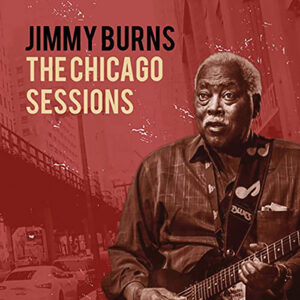 The Chicago Sessions
The Chicago Sessions
Krudtmejer – No #
Septuagenarian Jimmy Burns did, indeed, record the vocals and guitar for these sessions in Chicago, but the backing tracks were laid down in Denmark under the auspices of producer/label owner Laust “Krudtmejer” Nielsen. Originally released last year, it was intended to lay the groundwork for a 2020 Scandinavian tour, but that idea got scuttled by the pandemic.
Three of the tracks here—Back in the Day, Waiting for the Bus, and Chicago Avenue—are excerpts from interviews with Burns, in which he recalls various events from his life in the Windy City. Musically, meanwhile, the set relies pretty heavily on well-worn standards—Killing Floor, Everyday I Have the Blues, Mean Old Frisco, I’m Ready—which Burns delivers with his characteristic professionalism and unerring musicality, but to which there’s little he can add at this late date, although producer Nielsen should be given credit for his fresh-sounding arrangements, and Burns’ guitar playing (especially his sinuous slidework on Everyday) ignites some sparks. Burns also reprises his own Stranded in Clarksdale, which originally appeared on his 2003 Back to the Delta CD; this time it’s been given a somewhat electronified, spooky ambience, but it retains the feeling of backwoods terror and dissociation that characterized the original.
More interesting are Burns’ takes on material not usually associated with the blues canon. I Know You’re Gone, penned by guitarist Morten Lunn, is a moody, minor-key lament that allows Burns to summon his still-potent soul blues chops (before he committed himself to the blues, he recorded a series of now highly sought soul 45s in the 1960s). Foreigner’s Cold as Ice, as unlikely a vehicle as it may seem, is actually the set’s highlight—Burns, who has worked in doo-wop, folk, and pop as well as soul and blues over the course of his 60-plus-year career, has no problem negotiating the song’s non-blues melodic structure, and he wraps his dusky-smooth vocals around the lyrics’ tale of romantic treachery with gusto.
This disc will probably not find a place in the catalog of Jimmy Burns “must-haves,” but on its own terms, it’s an entertaining, and occasionally superb, portrait of one of Chicago’s most beloved musical elder statesmen who is still near the top of his game.
—David Whiteis


